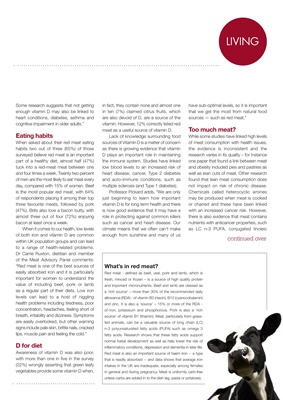
Some research suggests that not getting
enough vitamin D may also be linked to
heart conditions, diabetes, asthma and
cognitive impairment in older adults."
Eating habits
When asked about their red meat eating
habits two out of three (65%) of those
surveyed believe red meat is an important
part of a healthy diet; almost half (47%)
tuck into a red-meat meal between one
and four times a week. Twenty two percent
of men are the most likely to eat meat every
day, compared with 15% of women. Beef
is the most popular red meat, with 64%
of respondents placing it among their top
three favourite meats, followed by pork
(47%). Brits also love a bacon butty, with
almost three out of four (72%) enjoying
bacon at least once a week.
When it comes to our health, low levels
of both iron and vitamin D are common
within UK population groups and can lead
to a range of health-related problems.
Dr Carrie Ruxton, dietitian and member
of the Meat Advisory Panel comments:
"Red meat is one of the best sources of
easily absorbed iron and it is particularly
important for women to understand the
value of including beef, pork or lamb
as a regular part of their diets. Low iron
levels can lead to a host of niggling
health problems including tiredness, poor
concentration, headaches, feeling short of
breath, irritability and dizziness. Symptoms
are easily overlooked, but other warning
signs include pale skin, brittle nails, cracked
lips, muscle pain and feeling the cold."
D for diet
Awareness of vitamin D was also poor,
with more than one in five in the survey
(22%) wrongly asserting that green leafy
vegetables provide some vitamin D when,
LIVING
What's in red meat?
Red meat - defined as beef, veal, pork and lamb, which is
fresh, minced or frozen - is a source of high quality protein
and important micronutrients. Beef and lamb are classed as
a 'rich source' - more than 30% of the recommended daily
allowance (RDA) - of vitamin B3 (niacin), B12 (cyanocobalamin)
and zinc. It is also a 'source' - 15% or more of the RDA -
of iron, potassium and phosphorous. Pork is also a 'rich
source' of vitamin B1 (thiamin). Meat, particularly from grassfed animals,
can be a valuable source of long chain (LC)
n-3 polyunsaturated fatty acids (PUFA) such as omega 3
fatty acids. Research shows that these fatty acids support
normal foetal development as well as help lower the risk of
inflammatory conditions, depression and dementia in later life.
Red meat is also an important source of haem iron -- a type
that is readily absorbed -- and data shows that average iron
intakes in the UK are inadequate, especially among females in
general and during pregnancy.
in fact, they contain none and almost one
in ten (7%) claimed citrus fruits, which
are also devoid of D, are a source of the
vitamin. However, 12% correctly listed red
meat as a useful source of vitamin D.
Lack of knowledge surrounding food
sources of Vitamin D is a matter of concern
as there is growing evidence that vitamin
D plays an important role in maintaining
the immune system. Studies have linked
low blood levels to an increased risk of
heart disease, cancer, Type 2 diabetes
and auto-immune conditions, such as
multiple sclerosis (and Type 1 diabetes).
Professor Pickard adds, "We are only
just beginning to learn how important
vitamin D is for long term health and there
is now good evidence that it may have a
role in protecting against common killers
such as cancer and heart disease. Our
climate means that we often can't make
enough from sunshine and many of us
have sub-optimal levels, so it is important
that we get the most from natural food
sources - such as red meat."
Too much meat?
While some studies have linked high levels
of meat consumption with health issues,
the evidence is inconsistent and the
research varies in its quality - for instance
one paper that found a link between meat
and obesity included pies and pastries as
well as lean cuts of meat. Other research
found that lean meat consumption does
not impact on risk of chronic disease.
Chemicals called heterocyclic amines
may be produced when meat is cooked
or charred and these have been linked
with an increased cancer risk. However,
there is also evidence that meat contains
nutrients with anticancer properties, such
as LC n-3 PUFA, conjugated linoleic